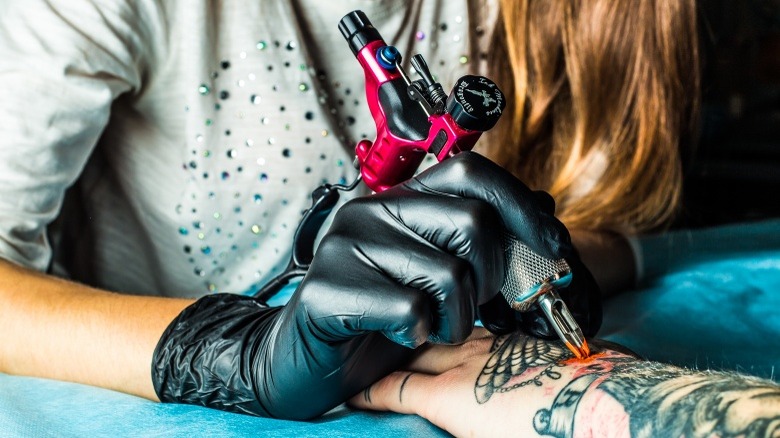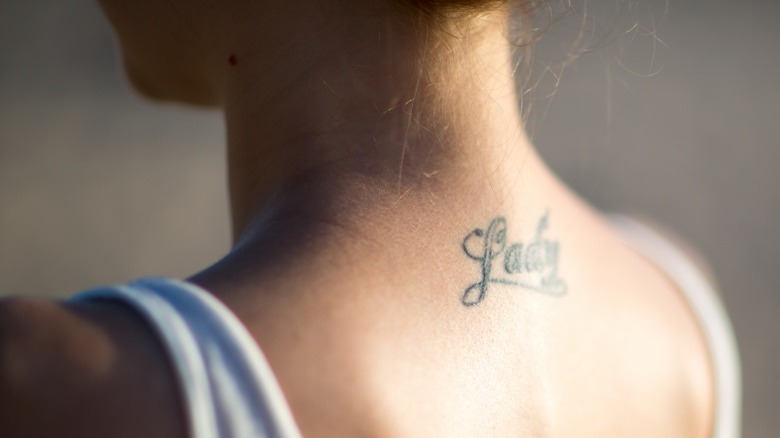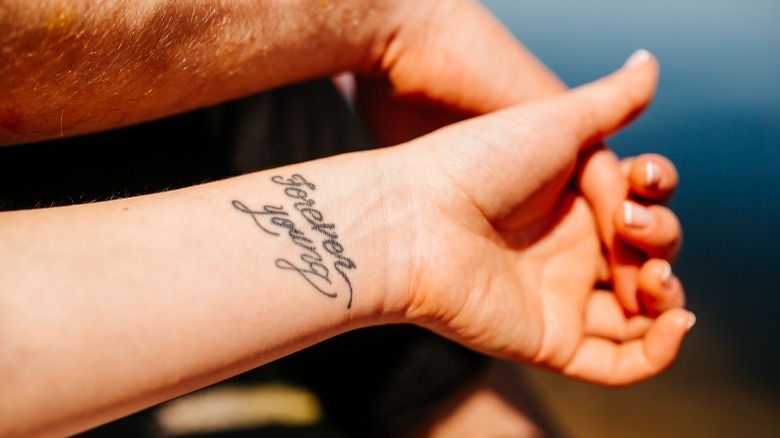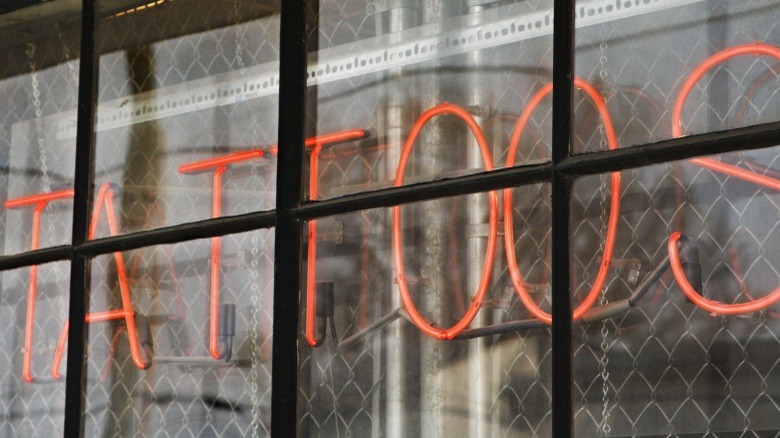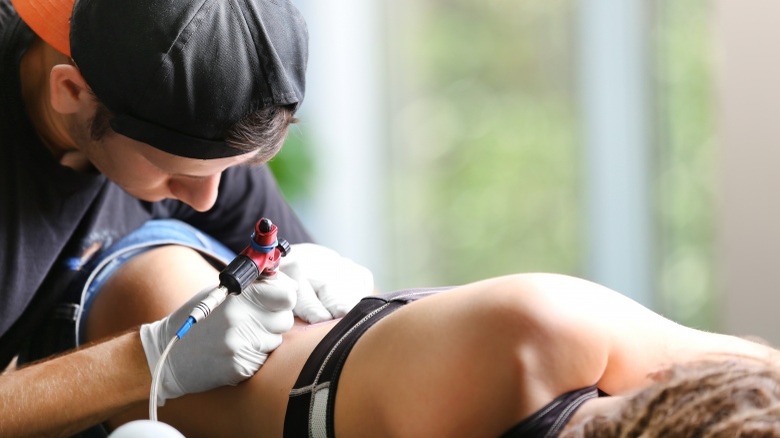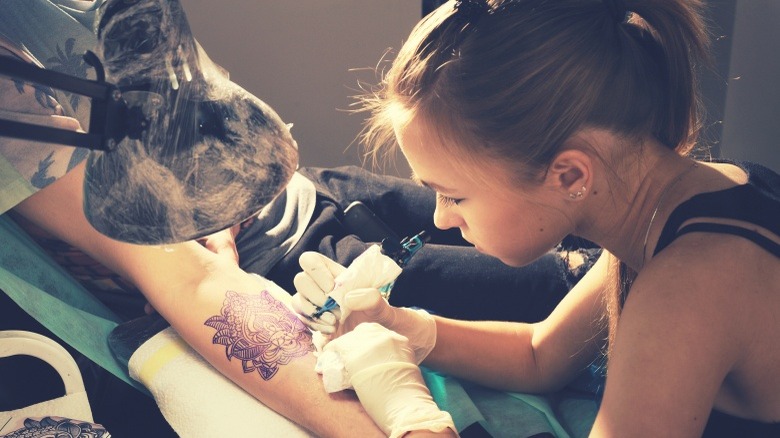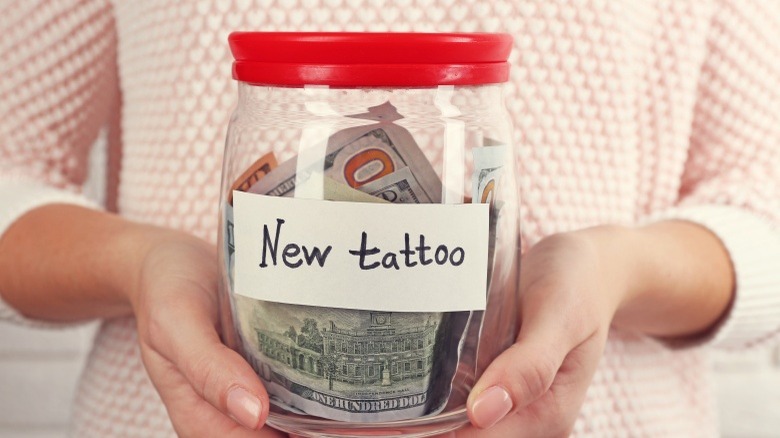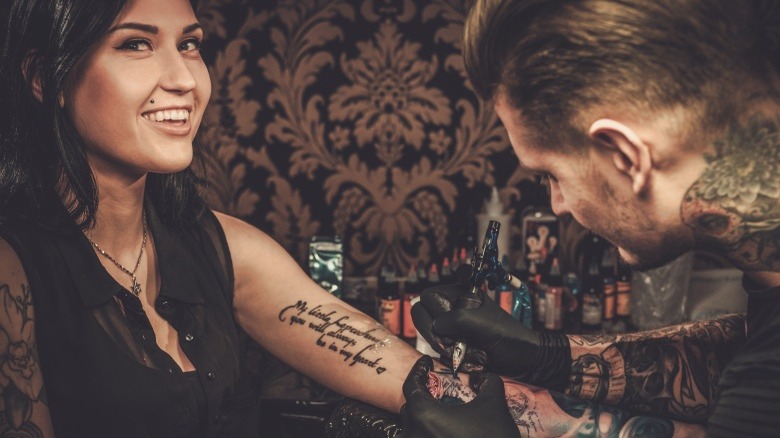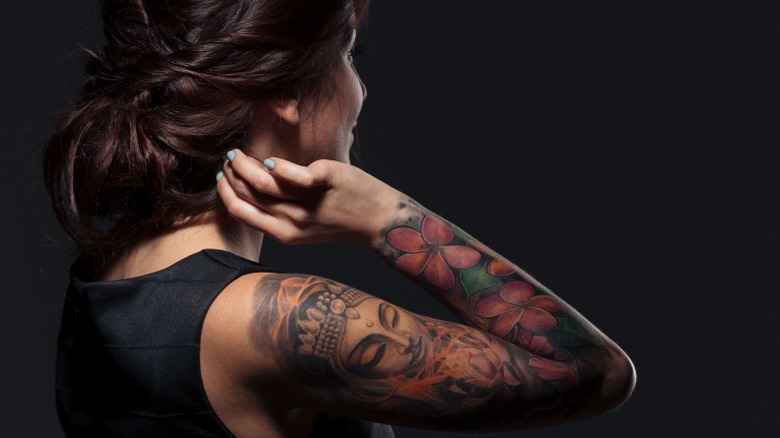Before You Get A Tattoo Consider These Things
There are a lot of things to consider before you get a tattoo. The first time I got a tattoo, I was almost 16 and crossed state lines with my mom. The two of us planned to get tattoos with my older brother when he turned 18, but Georgia law prohibits minors from getting inked, even with parental consent. My mom, being the coolest, still wanted her tattoo so we drove to Alabama, where you only have to be 16. We got ourselves some cool lower-back tattoos and made the trek back. It was the best bonding experience ever, and I don't regret it one bit.
Since then, I've gotten six more tattoos and plan to get more. It's true what they say about ink being addicting; I love every single one of mine. Still, you shouldn't take getting a tattoo lightly. If you're thinking about getting inked, there are a few things you should consider first. If you're not prepared to give it some thought, a tattoo may not be right for you. Here is what I've learned from my experiences getting tattoos that may help you if you're thinking about getting one as well.
Tattoos are permanent
This one seems obvious, right? But seriously, tattoos are very permanent and you should consider what that really means before you get one. Yes, you can get them removed, but laser removal can be expensive, tedious, and painful. If you're not sure you can handle having something on your body permanently, try using temporary tattoos for a bit to see if you like it. You might realize that you don't actually want ink.
Even if you do want ink, you may change your mind about what you want. Whatever you get on your body will be there forever, unless you choose to go through a potentially painful removal process. It should go without saying that your tattoo should be something you want on your body for the rest of your life.
That really cool design may seem like a good idea to put on your body now, but make sure it's something you'll still want to look at when you're 40, 50 and 60 years old. Take it from me: I have friends with very meaningful tattoos, but who got them removed because they didn't like them after a few years. And I have friends who have silly, on-a-whim pieces that they'll never get removed.
Consider the placement
Before you get a tattoo, you're going to want to decide what you want. But where you get a tattoo can be just as important as what you get. Some locations on the body can be more painful than others. Some locations can get you more judgmental looks than others (I have a lower back tattoo, trust me). You also might want to consider placement based on your workplace. I'm fortunate I work in a creative industry where tattoos are welcomed and displayed proudly. However, if you work in a more conservative field, you might not be able to show off your ink. If you're unsure of where you want it, you can ask the artist to do the temporary stencil on the parts you're considering so you can see what it looks like.
Do your research
Finding a good tattoo shop with a good artist is imperative so before you get one, you'll need to decide who you're going to trust with permanently inking your body. You probably don't want to go to some sketchy place and risk getting a tattoo that looks nothing like you pictured. I recommend spending time researching tattoo shops and artists in your area. Read the reviews thoroughly. Ask your tattooed friends where they got their ink and if they have a recommendation. Most of my tattoos have been done at shops I was referred to.
I highly recommend physically going to different shops and speaking with the artists, especially if you want a detailed piece. If you get bad vibes when you walk into a place, then leave. If it looks dirty, keep searching. Tattoo parlors should smell super clean, like a sterile hospital. I mean, you're literally getting ink injected into your skin. The place needs to be spotless.
And don't forget to make an appointment when it's time for your ink! Many places accept walk-ins, but many are by appointment only. Even if you find a walk-in shop, you might want to make an appointment, especially if it's your first tattoo. This gives you time to speak with the artist and a little more time to think about it.
Know that it can hurt
Everyone's pain tolerance is different, but it's important to know before you get one that tattoos can really hurt. Personally, I think it feels like constant finger pricks at the doctor's office and a hot rubber band snapping against your skin. You may get a little numb after a while, and the pain can subside after your adrenaline kicks in. I've never cried while getting a tattoo, but a lot of people I know have. Others may scream. It really can depend on your pain tolerance and where you get your tattoo. My most painful was one on my shoulder because I'm particularly bony. Softer, more plush areas with thick skin may not hurt as much. You may also be sore afterwards, similar to when you get a flu shot.
Follow the aftercare instructions
Before you get a tattoo, you should also think about what you'll need to do for it afterward. If you're not prepared to deal with caring for your tattoo, you probably shouldn't get one. It's not like having a puppy or anything, but you will have to be diligent about the aftercare, especially for the first two weeks. From my experience, you need to gently cleanse your tattoo with warm water and antibacterial soap every few hours, and then apply a thin layer of Aquaphor or unscented lotion. You'll repeat the process for 5-7 days.
Be warned: your tattoo will likely flake and peel. Don't worry! This is totally normal. After your tattoo has healed, it's important to still keep it moisturized and protected from the sun with sunscreen. For professional care advice, make sure to go over this with your tattoo artist and shop.
Timing is important
Of all the considerations before you get a tattoo, you may not have given much thought to when you'll get it (aside from making your appointment). But when you get your tattoo can also be very important. Fresh tattoos are not supposed to be exposed to sunlight, so you probably don't want to get one before you head to the beach for a week. I got my most recent tattoo on my inner bicep, not factoring in that I had a lot of literal heavy lifting to do at work that week. I was super sore and in a lot of pain. It's important to keep things like that in mind when you're deciding when to get your ink.
Be prepared for the cost
Tattoos aren't often cheap, nor should they be. Many shops have a minimum price, which covers opening a new needle, ink, and labor. The larger the tattoo, the higher the price it will most likely be. Many shops charge a certain rate per hour. It's very important to talk to a tattoo shop and artist before getting inked so you can get a quote of about how expensive your tattoo will be. I have a tiny tattoo that cost $50 and a large tattoo that cost about $250 after a few hours. And don't forget, you're paying an artist for what amounts to a commissioned piece, which also means tipping is strongly encouraged.
Bring in pictures and examples of what you want
Even if you know exactly what you want, you'll need to find examples of it before you get your tattoo. Don't just walk into a tattoo shop and start describing what you want. Bring photos, examples, and other tattoos you like. Your artist needs to have an idea of what you want. I have a detailed bunch of cherry blossoms on my foot. I brought in a few pictures of what I liked, and my artist sketched a combination of the ones I liked most. The result was perfect and exactly what I was looking for. I drew another one of mine and just asked that the artist clean up the lines. The tattoo artist is going to do what you want to an extent, but they might also add in some artistic input. It's their job to do so, but you need to speak up if it doesn't look the way you want in a sketch.
Get inked, but be smart
Getting a tattoo is a very personal decision and can often lead to wonderful results. But there are a lot of things to be considered before you get one, and the process really shouldn't be rushed. Take your time to make sure you're going to a reputable place and getting a tattoo the right way so you don't end up with some distorted blob or an infected butterfly, or worse. That, I guarantee, you will regret.
